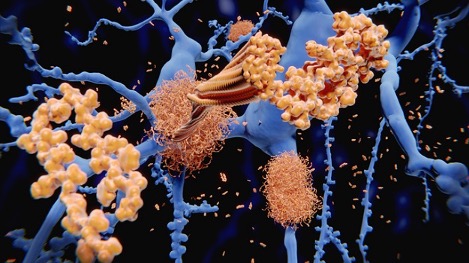Anavex’s Blarcamesine Slows Cognitive Decline in Alzheimer’s Patients
September 19, 2023
Source: drugdu
 323
323
By Tristan Manalac
 Pictured: Illustration of amyloid oligomers/iStock, selvanegra
Pictured: Illustration of amyloid oligomers/iStock, selvanegra
A follow-on analysis of a landmark Phase IIb/III study showed that Anavex Life Sciences’ investigational drug blarcamesine significantly slowed down cognitive decline in patients with Alzheimer’s disease, the company announced Thursday.
At 48 weeks, the change in the Alzheimer’s Disease Assessment Scale-Cognitive Subscale version 13 (ADAS-Cog13) scores in blarcamesine-treated patients was significantly better than placebo comparators. Blarcamesine was likewise significantly better than placebo when cognition was evaluated using the Clinical Dementia Rating scale Sum of Boxes (CDR-SB) scale, according to Anavex’s news release.
The company bolstered these clinical findings with biomarker data, which showed that blarcamesine treatment resulted in a significant drop in pathological amyloid beta levels and a corresponding improvement in Aβ42/40 ratio, pointing to the molecule’s strong anti-amyloid potential. Anavex’s drug candidate also resulted in lower brain volume loss versus placebo.
When it came to safety, the most common treatment-emergent adverse event was dizziness, most cases of which were transient and mostly mild to moderate in severity.
Currently, the approved Alzheimer’s treatments—and most of the promising therapies in development—are biologics, making use of antibodies to target and eliminate amyloid plaques in the brain. Anavex takes a different approach with blarcamesine, which is a small molecule oral drug.
“The advantage of blarcamesine (ANAVEX2-73) is that it is a small oral molecule that exerts clinical benefits on cognition and neurodegeneration and could be appealing because of its route of administration and excellent safety profile,” Marwan Sabbagh, chairman of Anavex’s scientific advisory board, said in a statement.
The drug works by selectively binding to the sigma-1 receptor (SIGMAR1), which is expressed at consistently high—if not increasing—levels in the brain of healthy aging adults. In Alzheimer’s disease, however, SIGMAR1 expression drops. SIGMAR1 activation has also recently been linked with autophagy, the cellular process by which damaged organelles and faulty proteins are cleared.
Treatment with blarcamesine leads to the upregulation of SIGMAR1 in the brain, which could potentially activate autophagy in the brain and help in the clearance of amyloid and tau deposits.
Beyond Alzheimer’s disease, Anavex is also testing blarcamesine in other neurodegenerative conditions such as Parkinson’s disease dementia, for which the candidate has cleared Phase II assessments and is being prepared for a Phase III trial.
The New York biopharma is also studying blarcamesine in Rett Syndrome. In February 2022, results from the Phase III AVATAR study in this indication was embroiled in controversy when STAT News’ Adam Feuerstein claimed—in a series of Tweets posted at the time—that the company changed its primary and secondary endpoints of the study, allowing it to declare success when the candidate had allegedly actually failed.
The company called Feuerstein’s allegations “false and untrue” claiming that the changes to the endpoints had been implemented early in the study, but that a third-party service provider had been late to update the trial’s Clinicaltrials.gov page
Read more on
- The first subject has been dosed in the Phase I clinical trial of Yuandong Bio’s EP-0210 monoclonal antibody injection. February 10, 2026
- Clinical trial of recombinant herpes zoster ZFA01 adjuvant vaccine (CHO cells) approved February 10, 2026
- Heyu Pharmaceuticals’ FGFR4 inhibitor ipagoglottinib has received Fast Track designation from the FDA for the treatment of advanced HCC patients with FGF19 overexpression who have been treated with ICIs and mTKIs. February 10, 2026
- Sanofi’s “Rilzabrutinib” has been recognized as a Breakthrough Therapy in the United States and an Orphan Drug in Japan, and has applied for marketing approval in China. February 10, 2026
- Domestically developed blockbuster ADC approved for new indication February 10, 2026
your submission has already been received.
OK
Subscribe
Please enter a valid Email address!
Submit
The most relevant industry news & insight will be sent to you every two weeks.



